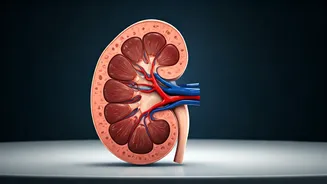Protein Overload Concerns
Consuming excessive protein can potentially pose several health risks. The body has limitations in how it can process and use protein efficiently. When
protein intake surpasses the body's needs, the excess can lead to several challenges. One of the main concerns is the potential strain on the kidneys. These organs play a crucial role in filtering waste products, including those produced by protein metabolism. Overworking the kidneys due to high protein intake might compromise their function over time, especially for individuals with pre-existing kidney conditions. Moreover, excess protein can also be converted into glucose, potentially impacting blood sugar levels and increasing the risk for metabolic issues.
Kidney Health Risks
One of the primary concerns associated with high protein diets is the potential strain they place on the kidneys. These vital organs are essential for filtering waste products from the blood, and protein metabolism generates waste that the kidneys must process. When an individual consumes excess protein, the kidneys must work harder to filter out the increased waste load. This added workload can be particularly detrimental to people who already have kidney conditions. Over time, the constant strain may exacerbate existing issues, potentially leading to a decline in kidney function. Therefore, it is important to understand the balance of protein intake, especially if there are any underlying health problems.
Digestive System Impacts
Excessive protein consumption can also impact the digestive system. Diets high in protein are sometimes associated with constipation because they can lack sufficient fiber, which is crucial for regular bowel movements. Fiber helps to regulate the digestive process by adding bulk to the stool, making it easier to pass. Without adequate fiber, the digestive system may slow down, causing constipation. Additionally, some individuals may experience other digestive issues like bloating or gas when consuming too much protein. It's because the digestive system can struggle to break down and process the high protein load efficiently. Finding the correct balance is important to maintaining a healthy digestive system.
Metabolic and Blood Sugar
Besides digestive and kidney-related concerns, over-consuming protein can impact metabolic processes. When the body has more protein than it needs for repair and growth, it converts it into glucose through a process called gluconeogenesis. This conversion can elevate blood sugar levels, potentially leading to insulin resistance and increasing the risk of type 2 diabetes. Furthermore, an unbalanced diet high in protein and low in carbohydrates may hinder overall metabolic health. The body depends on a balance of macronutrients, and disrupting this balance can trigger metabolic disorders and other related issues. Being mindful of these potential impacts can help you make better nutritional choices.
Heart Health Concerns
While high protein intake isn’t directly linked to heart disease, the dietary patterns often associated with high protein intake can pose indirect risks. Many high-protein diets often involve consuming large amounts of saturated fats from animal products. Saturated fats are known to increase cholesterol levels, which can contribute to the development of heart disease. Furthermore, some processed protein sources, like certain protein bars or shakes, may contain added sugars and unhealthy additives. These substances can also increase the risk of heart disease. It's essential to consider the overall dietary context, including the types of protein sources and other components of the diet, to understand the full impact on heart health.
Achieving Dietary Balance
Creating a balanced diet is important to avoid the potential risks of overdoing protein. A well-rounded diet typically includes a mix of macronutrients—protein, carbohydrates, and fats—along with essential micronutrients, such as vitamins and minerals. Including a variety of protein sources, such as lean meats, fish, poultry, beans, lentils, and nuts, can ensure you get a broad range of amino acids and nutrients. Pairing protein with fiber-rich carbohydrates like whole grains, fruits, and vegetables helps promote healthy digestion and maintains stable blood sugar levels. Moreover, incorporating healthy fats from sources like avocados, nuts, and olive oil is important for overall health. Consulting with a healthcare provider or a registered dietitian can provide personalized guidance and support to develop a diet plan suited to your specific needs.














